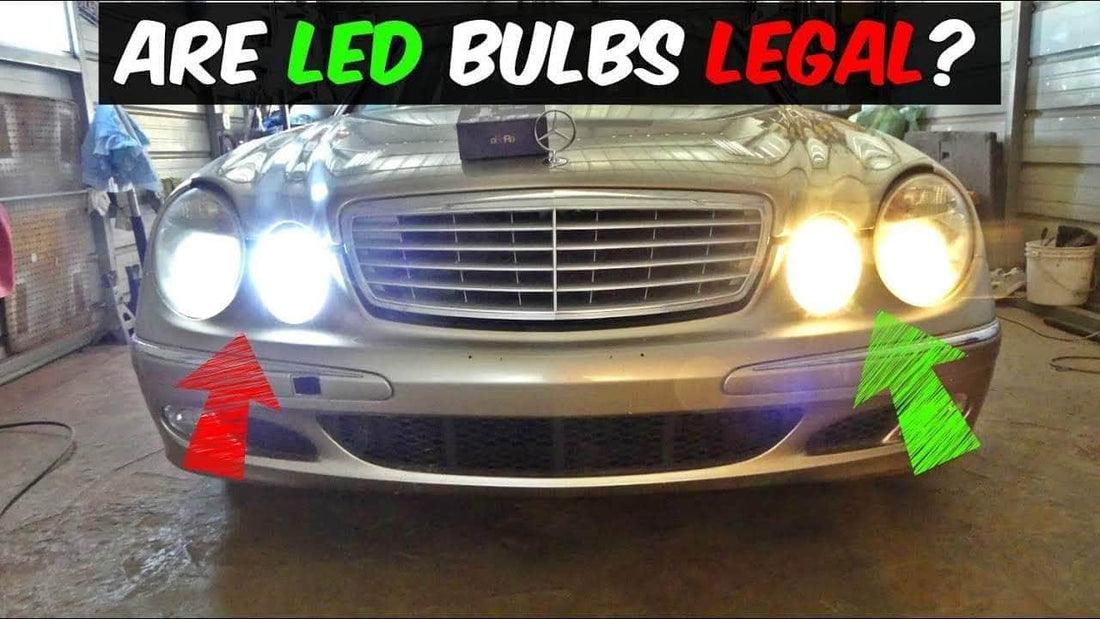Are LED Lights Legal? Discover the Truth Now!
Are LED lights legal? Yes, LED lights are legal in most countries, including the U.S., when they meet safety and vehicle regulations. However, certain colors or overly bright aftermarket LEDs may be restricted for vehicle use. Always check local laws to ensure compliance with street-legal lighting standards. With their energy efficiency and long lifespan, LED…
Are LED lights legal? Yes, LED lights are legal in most countries, including the U.S., when they meet safety and vehicle regulations. However, certain colors or overly bright aftermarket LEDs may be restricted for vehicle use. Always check local laws to ensure compliance with street-legal lighting standards.
With their energy efficiency and long lifespan, LED lights are becoming increasingly popular. But before you make the switch, it’s crucial to understand the legalities involved. You don’t want to end up on the wrong side of the law, right?
We’ll uncover the legal landscape surrounding LED lights, ensuring you have the knowledge to make informed decisions. Stay with us, and you’ll discover everything you need to know to stay compliant and enjoy the benefits of LED lighting without any legal worries.

Credit: www.carifex.com
Are LED Lights Legal?
Led Lights And Traffic Laws
LED lights offer energy efficiency and bright illumination. But their legality in vehicles can be tricky. Traffic laws vary across regions, impacting how LED lights are used. Understanding these regulations ensures compliance and safety on the road.
Read More: Why are My Led Lights Strobing? Troubleshoot Now!
Led Lights And Visibility
Visibility is crucial for safe driving. LED lights enhance clarity in low-light conditions. Brightness levels must meet legal standards. Excessive brightness can blind other drivers. This may result in fines or penalties.
Color Restrictions For Led Lights
LED lights come in various colors. Traffic laws often restrict colors. Red and blue lights are usually reserved for emergency vehicles. Using these colors can confuse other drivers. Stick to approved colors for your safety.
Placement Of Led Lights
The position of LED lights matters. Front and rear placements have specific rules. Improper installation may lead to traffic violations. Check local regulations before installing LED lights on your vehicle.
Legal Penalties For Non-compliance
Non-compliance with LED light laws can lead to penalties. Fines vary based on the region. Repeat offenses may result in harsher penalties. Staying informed about legal requirements is essential.

Credit: www.carifex.com
Safety Concerns And Standards
When considering the switch to LED lights, many people wonder about their safety and legality. LED lights are generally safe and legal, but you should be aware of certain standards and concerns. Understanding these can help you make informed decisions and avoid potential pitfalls.
Read More: What is the Best Led Light Color to Sleep With? Discover Now!
Safety Concerns
LED lights are typically safe, but they come with certain considerations. One common concern is the intensity of the light. Some LEDs can be very bright, which might cause discomfort or eye strain. You might have experienced this if you’ve ever tried to read under a harsh LED bulb.
There’s also the issue of blue light emission. LEDs can emit more blue light than traditional bulbs. This can affect sleep patterns, especially if you use LED lights in the evening. You might want to consider using warm LED lights to minimize this effect.
Heat management is another concern. Although LEDs produce less heat compared to incandescent bulbs, they still need proper ventilation. Improper installation can lead to overheating, which might reduce the lifespan of the bulbs. Have you ever noticed an LED bulb flickering? It might be a sign of overheating.
Compliance With Standards
LED lights must comply with specific standards to be legal for use. The International Electrotechnical Commission (IEC) sets guidelines for electrical devices, including LEDs. These standards ensure the products are safe and reliable.
In the United States, the Department of Energy regulates LED lighting through Energy Star certifications. Products with this label have been tested for efficiency and safety. You can check for this certification when purchasing LED lights.
Local regulations can also impact LED light legality. Different states or countries might have varying standards for electrical products. Have you ever traveled and noticed differences in lighting quality? This could be due to differing local standards.
Personal Experience And Insights
I once installed LED lights in my kitchen, aiming for energy efficiency. While they were bright and cost-effective, I noticed a harsh glare when cooking at night. This led me to explore softer, warm-toned LEDs, which made the environment more comfortable. Have you considered how the type of LED light might affect your space?
The installation process taught me the importance of adhering to safety standards. Ensuring proper ventilation and using certified products prevented potential overheating issues. Could overlooking these details compromise your lighting setup?
These experiences highlight the importance of understanding safety concerns and standards when choosing LED lights. As you explore options, consider the impact on your daily life and space. What steps will you take to ensure safety and compliance with standards in your lighting choices?
Environmental Impact And Benefits
LED lights have become a popular choice for lighting worldwide. Their environmental impact and benefits are significant. Many people wonder about their legality. Understanding their effects on the environment can help clarify this.
Environmental Impact
LED lights consume less energy than traditional bulbs. This reduces fossil fuel usage. Lower energy consumption means fewer carbon emissions. LED lights contribute to a cleaner planet.
The materials used in LED lights are often recyclable. This reduces waste in landfills. Recycling LEDs helps conserve resources. It promotes a sustainable lifestyle.
Energy Efficiency
LED lights are highly energy-efficient. They convert most energy into light. Traditional bulbs waste energy as heat. LEDs save electricity and reduce bills.
LEDs last much longer than regular bulbs. Their lifespan can be up to 25 times longer. This means fewer replacements and less waste.
Benefits To Ecosystems
LED lights have a lower impact on wildlife. Their light spectrum is less disruptive to animals. This helps maintain natural habits.
They do not emit ultraviolet rays. UV rays can harm plants and wildlife. LEDs provide a safer lighting option for ecosystems.

Credit: www.kchilites.com
Frequently Asked Questions
Is It Legal To Have Led Lights?
Yes, LED lights are generally legal. Regulations vary by location and application. Check local laws for specific requirements.
Is It Illegal To Change Headlights To Led?
Changing headlights to LED is legal if they comply with local regulations. Ensure they have proper brightness and beam pattern. Always check your area’s specific laws to avoid penalties. Consult a professional for installation to meet safety standards.
Are Led Headlights Illegal In Tx?
LED headlights are legal in Texas if they meet specific requirements. They must be white or amber and aimed correctly. Ensure compliance with state regulations for brightness and installation to avoid issues. Always check local laws for any updates or changes regarding vehicle lighting.
Conclusion
Navigating LED light legality is crucial for safe choices. Laws vary by location, so research is key. Using LED lights responsibly keeps you compliant. They offer energy savings and longevity. Always check local regulations before buying or installing. Stay informed to avoid fines.
Adapting to legal requirements ensures peace of mind. LED lights can be a smart and efficient option when used correctly. Stay updated, stay legal. Make informed decisions to enjoy the benefits without issues. Embrace LED technology wisely. Your safety and compliance come first.
Keep learning, keep shining brightly.

